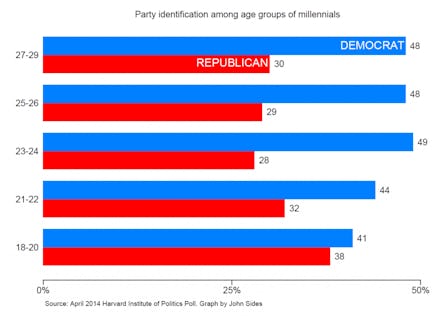Harvard Studied the Politics of Young People, and There's Some Bad News for Democrats

A new study by Harvard Univerity's Institute of Politics has revealed two big problems for the future of the Democratic Party. The first is that young people, and Democrats in general, are just not very excited about voting in the 2014 midterm elections. But the second finding might be more problematic: The youngest millennials aren't even very Democratic.
John Snides at the Washington Post graphed out the data and found that among under-23-year-olds, the partisan gap narrowed dramatically until 18 to 20-year-olds were only 3% less likely to be Republicans.
Furthermore, just 23% of voters say they will be "definitely" voting in the midterm elections. That's bad news for the left, which traditionally relies on high turnout to achieve victories at the national polls.
It gets worse when you consider the partisan split of those ready to vote. Forty-four percent of former Romney voters are "definitely" voting, compared to just 35% of Obama supporters. Self-identified conservatives are much more likely (32%) to definitely vote than self-identified liberals (22%). Men (28%) are more likely to definitely vote than women (19%), while young whites (who are becoming more conservative) also come in far higher (27%) than black and Hispanic people (19%).
Election implications: The elections are a long way away, and there's still plenty of time for the tide to turn, but as of today it looks like the 2014 midterms will be a tough fight for the Democratic Party, which can expect lower turnout and even some rebellion from young people in November. As Snides notes, it makes perfect sense that young people are turning to the right, having come of age under a Democratic president who is often less than popular and supervised an underperforming economy. Older millennials came of age under former President George W. Bush, and that experience likely made many of them permanent Democrats.
The poll only gives a potential 2016 matchup of Hillary Clinton versus Chris Christie, which seems a little unfair, given Christie's recent scandals (43% said their opinion of him had fallen in the past year). Still, Clinton leads with a favorability rating of 52%, compared to Christie's 21%. An astonishing 39% had a negative opinion of the New Jersey governor.
It seems rather unlikely that the younger millennials turning Republican are becoming traditional conservatives, especially given historically low levels of confidence in the government and virtually every major federal institution:
Given widespread agreement among younger people on social issues like same-sex marriage and adjusting marijuana laws, the GOP may be better off nominating either a socially liberal or libertarian-leaning candidate in 2016 than a hardliner, and especially should avoid proposing a social conservative.